Blowout: Legal Legacy of the Deepwater Horizon Catastrophe
APRIL 13, 2011
Roger Williams University School of Law
Bristol, RI
One of our nation's worst environmental and human disasters began on April 20, 2010 when the Deepwater Horizon oil rig exploded, killing 11 people and injuring 17 others, and spilling millions of gallons of oil into the Gulf of Mexico. What is the state of the law one year later as the human and environmental toll rises? This conference convened national leaders, elected officials and legal experts to examine the law’s response to this calamity to date and consider the future legal legacy. Those attending considered issues of tort liability, natural resource damages, and changes to law and regulation contemplated by Congress and the President's National Commission.
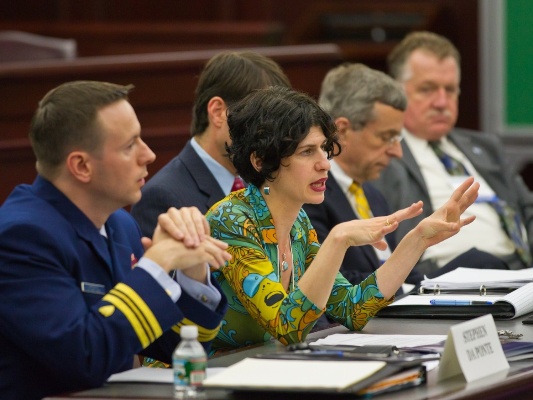
Juliet Eilperin, The Washington Post, speaks to attendees during Panel 1’s presentations.
Also shown is Stephen Da Ponte, Office of Maritime and International Law,
U.S. Coast Guard, Garrett Graves, Coastal Protection and Restoration Authority,
State of Louisiana, Sidney Shapiro, Associate Dean for Research and Development,
Wake Forest University School of Law, and David Westerholm,
Office of Response and Restoration, National Ocean Service - NOAA
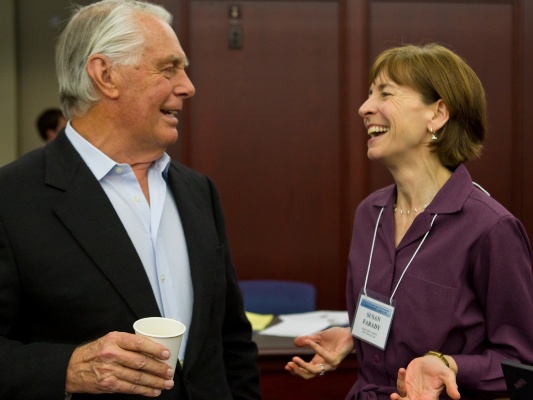
Fred Bartlit, Bartlit Beck Herman Palenchar & Scott and
Susan Farady, RWU School of Law Marine Affairs Institute
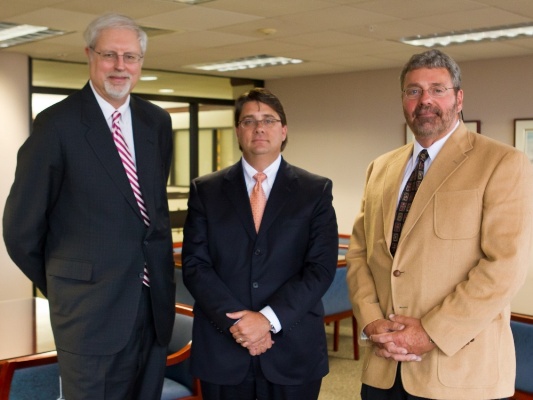
Dean David Logan with Kevin Dean, Motley Rice, and Harold Chittum, Chittum Skiffs
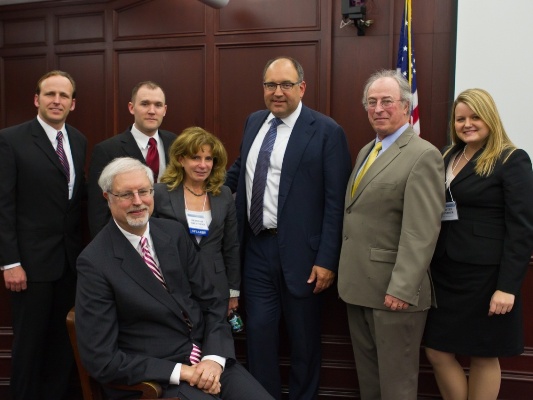
Dean David Logan, RWU School of Law (seated) with Christopher McNally ’13, Alastair Deans ’11,
Deborah Greenspan, Dickstein Shapiro LLP, Donald Migliori, Motley Rice,
George Conk, Fordham University School of Law, and Kristen Bonjour ‘13
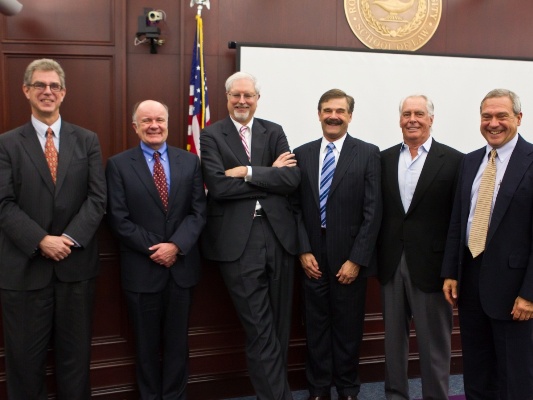
David Pettit, Natural Resources Defense Council, Thomas Galligan, Colby-Sawyer College,
Dean David Logan, Jonathan Waldron, Blank Rome LLP, Fred Bartlit, Bartlit Beck Herman
Palenchar & Scott, and Dennis Nixon, University of Rhode Island
Recordings
Opening Remarks and Keynote by Senator Sheldon Whitehouse (D-RI) (video-recorded):
Panel 1:
Moderator: Michael Burger, Professor of Law, RWU School of Law
Stephen Da Ponte, Atty., U.S. Coast Guard Headquarters, Office of Maritime and International Law
Julie Eilperin, Report, The Washington Post
Garret Graves, Director, Coastal Protection and Restoration Authority, State of Louisiana
Sidney Shapiro, Associate Dean for Research and Development, Wake Forest University School
of Law
David Westerholm, Director, Office of Response and Restoration, National Ocean Service, NOAA
Panel 1 Recording
Panel 2:
Moderator: Susan Farady, Director, Marine Affairs Institute, RWU School of Law
Harold T. Chittum, III, Chittum Skiffs
Kevin Dean, Esq., Motley Rice
James J. Opaluch, Professor & Dept. Chair, Environmental and Natural Resource Economics,
University of Rhode Island
Jill Rowe, Biologist, Applied Science Associates, Inc.
Panel 2 Recording
Panel 3:
Moderator: David A. Logan, Dean, RWU School of Law
George W. Conk, Adjunct Professor & Sr. Fellow, Stein Center, Fordham University
School of Law
Deborah E. Greenspan, Atty., Dickstein Shapiro LLP
Donald A. Migliori, Esq., Motley Rice
Panel 3 Recording
Keynote by Senator Jack Reed (D-RI) (video-recorded) - see link at Panel 4
Panel 4:
Moderator: Dennis Nixon, Associate Dean/Professor, University of Rhode Island
Fred J. Bartlit, Jr., Esq., Bartlit Beck Herman Palenchar & Scott, LLP and Chief
Counsel to National Commission on BP Deepwater Horizon Oil Spill
Thomas C. Galligan, Jr., President and Professor of Humanities, Colby-Sawyer
College
David Pettit, Senior Attorney, Natural Resources Defense Council
Jonathan K. Waldron, Esq., Blank Rome LLP
Panel 4 Recording
Resources
FINAL REPORT of the National Commission on the BP Deepwater Horizon Oil Spill and Offshore Drilling.
The Environmental Law Institute has posted a database that tracks the Deepwater Horizon oil spill cases. In addition, they have done a special issue of the Environmental Law Reporter devoted to the spill that is available to the public in its entirety, as well as links to other resources. Click here for the main page; you can access the database, ELR issue, and other links from there.
